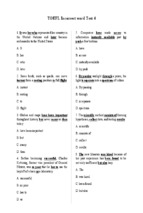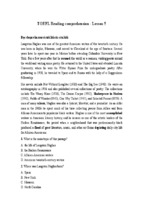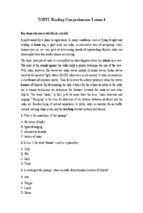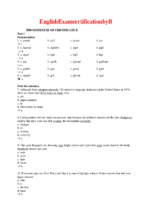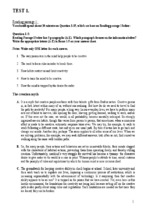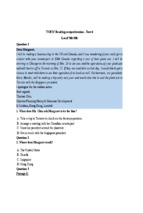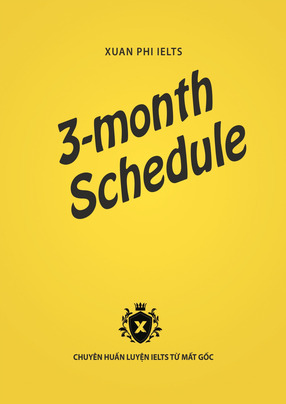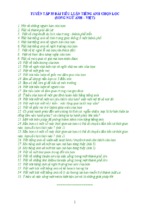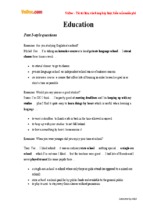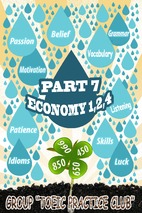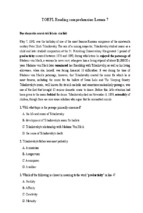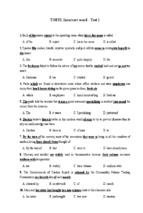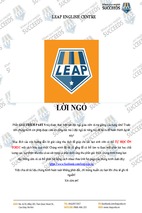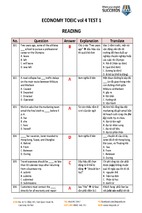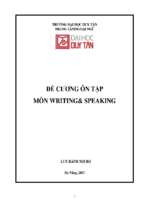LONGMAN
EXAM
SI and the texHs) carefully and use both as
the basis for your writing. You may have to write a letter, an
article, an essay or a proposal. All these text types will have a
discursive function in Part 1. In other words, you will have to
present and develop arguments, express and support opinions,
evaluate ideas, etc.
D
In Part 1 of the exam
you will lose marks if
you do not cover all the
points you are asked for.
It is extremely important
that you read the rubrics
and the input material
very carefully.
Think about your reader
Work with a partner. Look at the instructions (rubriC>in the exam question
again and answer the following questions.
1 What kind of publication
does the extract come from '?
2 Who has invited you to write a letter'?
3 Who is going to read your letter, besides the person
invited you to write'?
who has
In the exam, the letters
you may be required to
write will probably be
formal or semi-formal.
EJ
Think about register
a
Read the letter below which another reader wrote to the same newspaper on
a different topic.
I amwriting
to !:}ou about the article on out-of-town
shopping
centres. which !:}ou published last week. The article raised a number
of issues. which I would like to comment on here.
In the article. the writer claims that out-of-town
centres are to be
commended because the!:} provide a range of shops under one roof.
so the centres are 'convenient and accessible'. I am afraid I have to
disagree. Not being a motorist m!:}self.I find these centres an!:}thing
but convenient
Furthermore. I would like to remind !:}ou of the environmental
conseq.uences of bUilding shopping outlets outside towns. Large
areas of the countr!:}side are inevitabl!:} swallowed up for
development more roads are built and pollution is increased due to
the fact that motorists use their cars to drive to these centres.
Surel!:}it would be better to keep shopping centres in the centre of
our towns and cities. In that wa!:}. we could limit the impact on the
countr!:}side while at the same time making the centres accessible to
all. not just the motorist
Yours faithfulI!:}.
Sandra West
b
Now study the list below. It includes some of the characteristics of formal
language. Find examples of these in the letter in a.
• complex sentences
• sophisticated vocabulary used with precision
• passive forms
• polite or diplomatic phrasing
• participle clauses
• relative clauses
D
Identify the key points in the question
a
Work with a partner. Look at the instructions (rubric) in the exam question again and answer
the following question.
Why have you decided to write a letter? To comment on what the writer says in the
article? To give your own opinions? For some other reason?
1 How does the writer suggest we all feel about global warming?
2 What does he/she think we can do about the problem?
3 What examples does he/she give of things that cause global
warming?
4 Why is it so difficult to tackle the problem, according to the
writer?
5 What question does the writer ask at the end of his/her article?
(Factfile)
Cars, factories and power stations all emit poisonous
gases, including carbon dioxide, into the atmosphere;
these add to air pollution. The increase in carbon
dioxide in the Earth's atmosphere causes the gradual
warming of the Earth, which is called global warming.
As a result of global warming, we are witnessing
climate change. We can reduce pollution levels by
using less energy and cutting gas emissions. We could
cut down on manufacturing in factories if we
demanded fewer consumer goods like refrigerators
and washing machines. We can develop cleaner
technologies by producing cleaner petrol, for example.
Cars cause pollution and congestion. Other ways of
travelling are less harmful to the environment.
It is a good idea to
underline the key points
you need to address in the
exam question. In that
way, you will be sure you
don't leave anything out.
D
rainstorm the topic
Work with a partner and answer the questions. Note down the best ideas.
1 Why do we need power stations? And factories?
2 In what ways do factories and power stations pollute our environment?
Is there any way we can control this other than shutting them down
completely?
3 Do you think people need all the consumer goods they buy at present?
Do you think they throw them away too quickly?
4 How do ears damage the environment? Is there any way we can reduce the
damage other than banning them?
5 In your opinion, can we and should we tackle the problem of global
warming? How?
m Make a plan
Work with a partner and answer the questions.
a
Look at the following notes which one student has made. Tick (V) the points you think
she should include in the letter.' Put a cross (X) against any points that are irrelevant
or unimportant.
• reason for wri-ri-ng:
ro COfYlfYlenr on rt<.e arri-cle
• wt<.!:J L di-sagree
wi-rt<. rt<.e wri-fe.r
abootf
wt<.ar we can do
• wt<.!:J we st<.oL1ld and fYlL1d rac/<:Ie rt<.e problefYl
• t<.abi-rar desrrL1cfi-on
• t<.ow we can redL1ce
efYli-ssi-ons frofYl
• wt<.!:J we st<.oL1ld L1se fewer
• ort<.er wa!:Js ro redL1ce global
cle-aner
srafi-ons
warfYli-ng e,g, L1si-ng
rect<.nologi-es
• world poverr!:J
• ConCIL1si-on(SL1fYlfYlar!:Jof
fYl!:Jvi-ews
~~~~_.r-------------'
b
power
ConSL1fYlergoods
It is essential to plan what
you are going to write
before you start.
Otherwise, your writing
will be confused and
difficult for the reader to
follow.
....
~~
~
Look at the plan below. The student has already completed the plan for the first and last
paragraph of her letter. Decide which points she should put in each of the remaining
paragraphs.
Paragrapt<.
I·
Re-ason
for
on fke
arf~cle
wr~f~n3'
Paragrapk
2:
Paragrapk
3:
Paragrapk
4-.
Paragrapk
?: ConChlS-~onls-I.1MMar~
fo
COMMenf
A formal or semi-formal
letter usually begins by
stating briefly the reason
for writing.
of
M~
v~ews
Think about style
When writing to an editor or a person in a position of authority, you need to adopt a tone
that is not too direct or aggressive. Look at the pairs of phrases below and tick (V) the
ones that are more tentative or diplomatic.
1 a You say that ...
b You appear to claim that ...
4 a I would like to suggest that you should ...
b Why don't you ... ?
2 a I'm afraid I disagree.
b You are wrong.
5 a I expect you to ...
b I would be grateful if you would ...
3 a You must not say that.
b I think it is dangerous to say that.
B
Read a model letter
Read the model letter below and answer the following questions.
1 covered all the points in the exam question '?
2 used an appropriate format and style'?
3 stated her reason for writing'?
4 produced well-reasoned arguments'?
5 stated her opinion clearly'?
6 linked sentences and paragraphs together appropriately'?
7 included any irrelevant points'?
8 rounded off her letter in a suitable way'?
56 Sunderbury Road
West Heath
Yorkshire YH3 4HD
3rd March 200The Editor
The Daily News
Lime Street
Yorkshire YM9
Dear SirlMadam,
I am writing to you about the article on global warming which appeared in your
newspaper last Saturday. It raised some basic issues which I feel very strongly about and I
think all your readers need to consider them carefully.
At the start of the article, the writer appears to claim that the situation with regard to
global warming is hopeless. I am afraid I disagree. What is more, I think that if we fail to
take action now, the consequences for our planet will be disastrous.
In my opinion, we have to work together to persuade industry to cut emissions of gases
from factories and power stations. However, this does not mean that we have to return to
the 'dark ages'. It is possible to reduce the number of goods we manufacture without
cutting production completely. On the other hand, I do feel the consumer society has gone
too far. In our 'throwaway' society, things cost more to repair than to replace. This is all
wrong. We need to make things that last. If we did this, it would automatically lead to a
reduction in manufacturing.
There are other ways we can tackle global warming, too. Industries could be persuaded to
develop cleaner technologies. This has already begun in the car industry, where they are
developing vehicles that do not bum petrol. Of course, public transport should be
encouraged too, as it is a better alternative to the private car and causes less pollution.
In conclusion, I want to say that it is dangerous to suggest that all our efforts to tackle
global warming are useless. We can and must do something about it. And moreover, we
can do this without destroying our economy or altering our lifestyles completely.
Yours faithfully,
Jessica Burton
Jessica Burton
Think about paragraphing
a Summarise the topic of each of the paragraphs in the model
text in the template below.
Paragraph 5: Concluding remarks/summary: It is dangerous to
say we can do nothing because we can make a
difference without crippling our economies/altering
our lifestyles completely.
b
Paragraphs act as
stepping stones
in a text and make
it easier for the
reader to follow.
You should start a
new paragraph each
time you introduce a
new topic in your
writing.
Do each of the paragraphs in the model letter contain a topic sentence?
Find them and underline them.
Most paragraphs contain a topic sentence. A topic sentence should
summa rise the theme of the paragraph. The other sentences in the paragraph
explain, exemplify or expand the information in the topic sentence.
1m Think about language
a
Underline the words the writer uses in the model letter to show addition and contrast.
furthermore
on the other hand
what's more
I).evertheless
although
moreover
however
added to this
C Which phrase does the writer use to introduce her concluding paragraph?
Which of the phrases below could you use instead?
All in all, ...
To sum up, ...
At the end, ...
At last, ...
m Think about vocabulary
Collocations
a
Match the verbs (1-6) that collocate with the nouns (a-f).
1
2
3
4
5
6
make
solve
Gut
protect/ conserve
raise
take
b Underline
a
b
c
d
e
f
a problem
steps/action
a suggestion/a point
an issue/an objection
emissions/production
the environment
the correct option.
1 I feel very hardly / strongly about these matters.
2 In your article, you refuse / claim there is nothing
3 We need to take immediate
4 The steps I have suggested
more we can do.
measures / measurements
to reduce pollution.
would guide / lead to a reduction
S If we fail / neglect to act soon, the consequences
in pollution.
could be disastrous.
6 I do not agree that what we are doing is a loss / waste of time.
IE
Exam practice: Write a letter to the editor
You are going to write a letter to an editor. Read the exam question and follow the
instructions below.
Part 1
You must answer this question.
an appropriate style.
Write your answer in 300-350
words
in
The extract below is part of a newspaper article on culture and traditions.
Readers were asked to send in their opinions. You have decided to write a
letter responding to the points raised and expressing your own views.
We are losing our individual customs and traditions. In these days of cheap,
fast air travel and modern technology, different countries are becoming
more and more alike. Whichever country we come from, we are likely to
listen to the same music, to wear the same clothes, and to watch the same
films. Young people often know little about the traditions of the area they
come from. Should nations try to preserve the customs that make us
different from each other and, if so, how can we achieve this?
• Read the question
Underline all the points asked for in the
exam question (including rubric and input
material) and include them in your letter.
• Think about your reader
Write in a style appropriate for a formal
letter and use this style consistently. Do not
use an aggressive tone.
• Brainstorm the topic
Note down ideas and make a plan before
you begin.
• Think about paragraphing
Organise your ideas into clear paragraphs
around one topic sentence. Begin by giving
your reason for writing and referring to the
newspaper article.
• Think about format
See page 14 for the layout of a formal letter.
D
Read the question
Read the exam question below carefully.
In Part 1 of the Writing Paper, you may
be given visual as well as written input.
Part 1
You must
style.
answer this question.
Write your answer in 300-350
words
in an appropriate
The road through the centre of your village is becoming increasingly busy and dangerous.
Last night you saw the article below in a local newspaper. You have decided to write to your
local council, referring to the accident described in the article and stating your concern
about the traffic situation. You should also state your support for the bypass and make a
suggestion about what should happen next.
Boy Injured
in Accident
Blackspot
Local teenager, Tom Smith, 15, had a
miraculous escape when he was hit by a
lorry outside the gates of his school
yesterday. The lorry skidded and crashed
after taking the bend at Bailey's Bridge
too quickly. It is the third accident in the
village this month. 'There is just too much
traffic going through our village these
days,' complained headmaster Stephen
Brown. 'We desperately need a bypass.
I've written to the council and even sent
them a diagram showing where the bypass
could go, but I've had no reply.' He
. appealed to residents who support his
proposal to write to the council urgently.
EJ
Think about your reader
Work with a partner. Look at the instructions (rubric) in the exam question again
and answer the following questions.
1 Who have you decided to write to?
2 What is their role in the village?
3 Who do they represent?
4 How can they help?
5 As a resident writing on a serious topic, how should you address
these people in a letter? Should your tone be formal or informal?
Identify the key points in the question
a
Work with a partner. Look at the instructions (rubric) in the'exam question
again and answer the following questions.
1 Where do you live?
2 What's wrong with the road through the village?
3 Where did you see the article about a recent accident?
4 You are asked to do four things in your letter. What are they?
Underline them in the exam question.
b
Now look at the extract in the exam question again and answer the following
questions.
1 What happened
yesterday?
2 Where and why did it happen?
3 Is it the first time something like this has happened?
4 What does the headmaster
blame? What does he want the council to do?
5 How have the council reacted so far?
6 What does the headmaster
urge other residents to do? Why?
(Factfile)
The council is the organisation responsible for local government in a particular
region in Britain. Members of the council are called councillors. They make
decisions on certain local issues like roads, traffic, housing etc.
Brainstorm the topic
Work with a partner. Imagine you are residents in the village. Discuss these questions and
note down the best ideas.
1 Why is the road through
coming from/going to?
your Village getting busier? Where is all the extra traffic
2 Why is the road unsuitable for the increased level of traffic? Is it too narrow/too
steep/too dark? Has it got too many sharp bends/narrow
bridges?
3 What reasons could you use to persuade the council to consider building
What could you claim will happen if something is not done soon?
4 How do you think other residents
a bypass?
feel about the situation?
5 What suggestions could you make to the council?
Conduct a survey? Something else?
Call a public meeting?
Work with a partner and answer the following questions. Can you remember how to set
out a formal letter in English? Indicate where the following items should appear on the
template.
• your address
• the greeting (Dear X,)
• the date
• closing phrase (e.g. I loolLfoTwaTd to heaTingfi'om
•
your name
• the ending (e.g. YOUTSfa'ithfuUy,)
•
the name and address
of the recipient
you.)
In the exam, you are not
required to write any
postal addresses in your
letter.
D
Make a plan
Look at the plan below. The student has already completed most of the plan for his letter.
What points should he include in paragraph 4? Write them in.
Paragrap/A
/.
Re-as-on
and
for
- ConCe-rn
abol.1f
frafhc
acc~de-nfs-
2· T/Ae- facf
Paragrap/A
wr~f~ng
f/Aaf
Ie-ve-l of
frafhc
/Aas- r~S-e-n
IN /A1j f/A~s- /Aas- /Aappe-ne-d
3.' IN/A1j f/Ae- vUlage-
Paragrap/A
of
can'f
cope-
w~f/A
f/A~s-
afVIol.1nf
frafhc
4-: .,..... ,..,., ... " ..,., .... ".,., .... ,.,' .." ... ,... ,... " ..,., .... ,.... ,.."".,., .... J.
~,.~
D
'~r.. You will
lose marks if your
letter becomes
rambling or irrelevant.
You will probably
make more errors, too!
Think about your reader
Look at the exam question again and answer the following questions.
1 Who is going to read your letter?
4 What impressions
do you want your .reader
a a friend
to have of you?
b a person working in a company
a that you are friendly and laid back
c a colleague
b that you are polite but assertive
2 How will you begin your letter?
a Dear Mr or Mrs ... ,
c that you are angry and abrupt
5 What style of writing will your reader
b To Whom it May Concern,
expect?
c Dear Sir or Madam,
a formal
3 For what purpose are you writing?
Tick one or more of the following:
a to complain
b to give reasons for something
c to apologise
d to make suggestions
e to request something
b informal and friendly
Identify the key points in the question
ark with a partner. Look at the exam question again and answer the following questions.
1 \iVhere have you just returned from?
2 \Vhy were you there?
D
3
\h,There
4
\h,Tho
did you stay?
organised your travel and accommodation
arrangements?
5 \~at
did you think of your stay?
6 ~at
are the fouT main things you must do in your letter?
Brainstorm the topic
Work with a partner and answer the questions. Note down the best ideas.
1 Imagine you have just come back from a disappointing foreign holiday.
~ere
did you go?
2 ~at
was wrong with the resort? Was it too small/crowded? Was it
noisy/dirty/over-developed? Was it too far away from civilisation? Was
there a different sort of problem'?
3 ~at
had the holiday company told you about the resort when you booked
your holiday there'? How was this description different from the truth'?
4 ~at was wrong with the hotel'? Was there something wrong with the
service/the facilities/the rooms/the food '?
5 How had the hotel been described to you when you booked your holiday'?
How was it different in reality'?
6 What action do you think the holiday company should take with regard to
a) the resort and b) the hotel, so that future holiday makers do not suffer in
the same way as you have'?
7 \\That kind of compensation do you think you should have'?
- Xem thêm -

